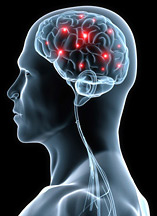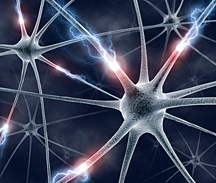There is also good evidence that deficiencies of these three B vitamins increase with age and are common in older adults. Thus, there is growing support for the premise that optimal B vitamin status can prevent, slow or reverse the deterioration in memory and other mental capacities important to quality-of-life issues in older individuals.
The Normative Aging Study, involving 70 male subjects, ages 54 to 81, revealed that blood levels of vitamin B
9 and B
12 appear to be related to cognitive performance in a different away than vitamin B
6. Low blood levels of these two vitamins were associated with deficits in spatial copying. Higher blood levels of vitamin B
6 were associated with better performance on two tests of memory. Another interesting finding was that nearly one-half of the subjects in the study
had low blood levels of vitamin B6.
 This study is extremely important because B vitamins are known to participate in brain chemistry and physiology. Vitamins B12 and folic acid are required as co-enzymes in the synthesis of the neurotransmitters, serotonin catecholamines (adrenaline, norepinephrine). They are also required for the production of S-adenosylmethionine, which has antidepressant properties. Vitamin B12 deficiency may also result in de-insulation of nerve fibers (demyelination), which produces a number of neurological symptoms. Vitamin B6 is a co-factor in the production of other brain chemicals (neurotransmitters) including dopamine, norepinephrine, serotonin, gamma-aminobutyric acid (GABA) and taurine.
This study is extremely important because B vitamins are known to participate in brain chemistry and physiology. Vitamins B12 and folic acid are required as co-enzymes in the synthesis of the neurotransmitters, serotonin catecholamines (adrenaline, norepinephrine). They are also required for the production of S-adenosylmethionine, which has antidepressant properties. Vitamin B12 deficiency may also result in de-insulation of nerve fibers (demyelination), which produces a number of neurological symptoms. Vitamin B6 is a co-factor in the production of other brain chemicals (neurotransmitters) including dopamine, norepinephrine, serotonin, gamma-aminobutyric acid (GABA) and taurine.
 Higher blood levels of homocysteine also often result from subnormal intakes of folic acid, vitamin B12 and vitamin B6. This is because these vitamins are required to recycle homocysteine to other amino acids such as methionine and cystathionine. High blood levels of homocysteine are associated with an increased risk of cardiovascular, cerebrovascular (narrowed arteries in the brain), and peripheral vascular disease (narrowed blood vessels in the arms, hands, legs and feet. Narrowed arteries in the brain (cerebrovascular disease) have been shown to be associated with decrements in psychomotor speed and on tests measuring fluid and visual abilities. Such cognitive dysfunction, therefore, may stem from high levels of homocysteine. As previously stated, vitamins B6, B12 and especially folic acid are key nutrients that prevent and reverse high blood levels of homocysteine.
Higher blood levels of homocysteine also often result from subnormal intakes of folic acid, vitamin B12 and vitamin B6. This is because these vitamins are required to recycle homocysteine to other amino acids such as methionine and cystathionine. High blood levels of homocysteine are associated with an increased risk of cardiovascular, cerebrovascular (narrowed arteries in the brain), and peripheral vascular disease (narrowed blood vessels in the arms, hands, legs and feet. Narrowed arteries in the brain (cerebrovascular disease) have been shown to be associated with decrements in psychomotor speed and on tests measuring fluid and visual abilities. Such cognitive dysfunction, therefore, may stem from high levels of homocysteine. As previously stated, vitamins B6, B12 and especially folic acid are key nutrients that prevent and reverse high blood levels of homocysteine.
In the Normative Aging Study, subjects with high levels of homocysteine performed, on average, like patients with mild Alzheimer's disease. They also exhibited difficulty in copying the most complex spatial figures. For example, few subjects in the highest 25 percent range of homocysteine concentrations completed the cube (22 percent) and tapered box (17 percent) correctly. By comparison, these figures are mastered by 50 percent of schoolchildren by the age of 13. Subjects with the lowest blood homocysteine levels demonstrated the best results on these tests.

